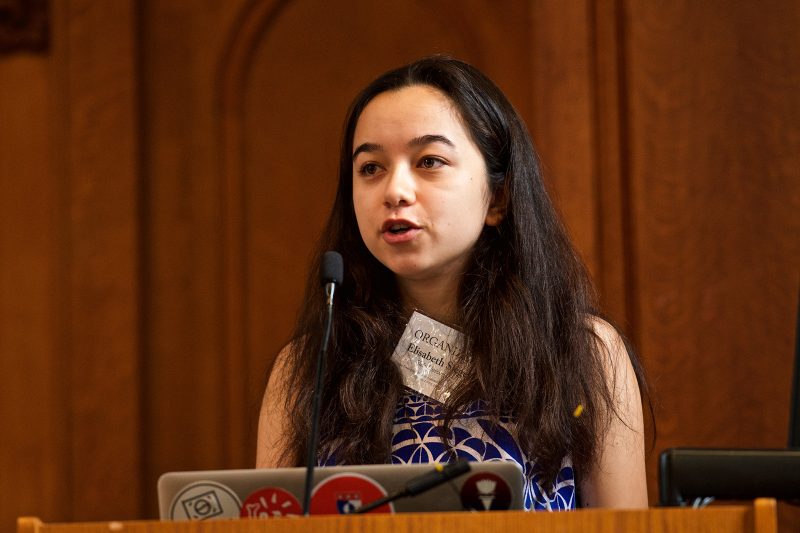Siegel (Global Affairs ’20) welcomes participants at the YIPC.
On February 10, the Jackson Institute’s halls were filled to the brim with a multitude of Yale students hailing from a variety of disciplines, class years, and academic backgrounds. They organized themselves — or, in some cases, were randomly assigned — into teams of four to five in order to compete in the Yale International Policy Competition (YIPC).
As an organizer, it was extremely gratifying to see my fellow undergraduates rise to the challenge, one that our keynote speaker, Ambassador Robert Ford, declared to be “really, really hard.” Students were given a topic at the beginning of the day that they hadn’t seen prior. In this case, we had them choose to focus on an aspect of the reconstruction (both in terms of tangible infrastructure and intangible societal ills) of post-ISIS Mosul, Iraq. Over the next six hours, they had to write a one-page policy brief and put together a full-fledged presentation to give to our panel of judges by the end of work time.
All of us, judges and organizers alike, were blown away by the quality of work that we received at the end of the work period. Competition was tight, and our judging panel included Ambassador Robert Ford, Ambassador Rosemary DiCarlo, Professor Elaine Dezenski, Professor Julie O’Brien, and Professor Catherine Panter-Brick, as well as two undergraduates, Malina Simard-Halm (TD ‘18) and Stephen Mettler (SY ‘18).
At the end of the day, though, five teams — with a majority of first years — proceeded with their policy proposals and presentations to the next round. At the conclusion of the final round, a team of first years took first place with their proposal “Renewable energy in Mosul,” taking a refreshing approach to the revitalization of Mosul while exploring environmentally friendly energy sources.
I started YIPC with a few friends last semester, but at its inception, I could have never imagined that a few short months later, the real thing would happen at the Jackson Institute. Throughout the process of YIPC’s creation, I held three core goals in my mind: to provide a competitive, engaging, entertaining, and challenging outlet for undergraduate students to cooperatively flex their policy-writing, problem-solving, and research skills on real-world problems; educate undergraduates about ongoing multilateral issues affecting a diversity of regions around the world; and help facilitate talented, intelligent young undergraduates’ exposure to notable actors in the field of international affairs, and allow for interested organizations and other firms to be able to reach out to them.
Our first YIPC taught me to never underestimate the determination of undergraduates invested in finding effective solutions to world problems. I’m excited to grow YIPC into a true inter-collegiate competition this coming fall in order to boost access to industry-relevant organizations for other colleges near and far, and to see what other exciting ideas my peers might have.
